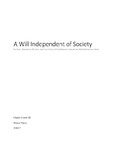A Will Independent of Society: Publius, Woodrow Wilson, and the Crisis of Confidence Caused by the Administrative State (thesis)

View/
Author
Correll, Charles C., III
Subject
Washington and Lee University -- Honors in Politics
Bureaucracy -- Political aspects
Administrative agencies -- U.S. states
Metadata
Show full item recordDescription
Thesis; [FULL-TEXT FREELY AVAILABLE ONLINE] Charles C. Correll, III is a member of the Class of 2017 of Washington and Lee University. The phrase the "Administrative State" offers perhaps the best description of the strange, distinctly American amalgamation of republican, constitutional principles and monarchical administrative practices. More than the growth of executive power, economic regulations, or the welfare state, the Administrative State encompasses and emphasizes the idea that the bureaucracy, in order for it to be effective, must exist outside society. Subsequently, the Administrative State describes the independence of the bureaucracy from the traditional limitations of government caused by the separation of powers. Predicated on a heightened trust in the neutrality and public-spiritedness of bureaucrats, the Administrative State has perpetuated the separation of politics and administration, originally an ideal promoted during the Progressive Era, and accumulated legislative, judicial, and executive power into its administrative apparatus of federal agencies and departments. Although it has only minimally violated the letter of the Constitution, it has caused a profound crisis of confidence in national government. Ultimately, the unmoored, unlimited powers of the modern bureaucracy starkly contrasts with the limited duties and authority of the administrators of the early American Republic. Charles Correll III